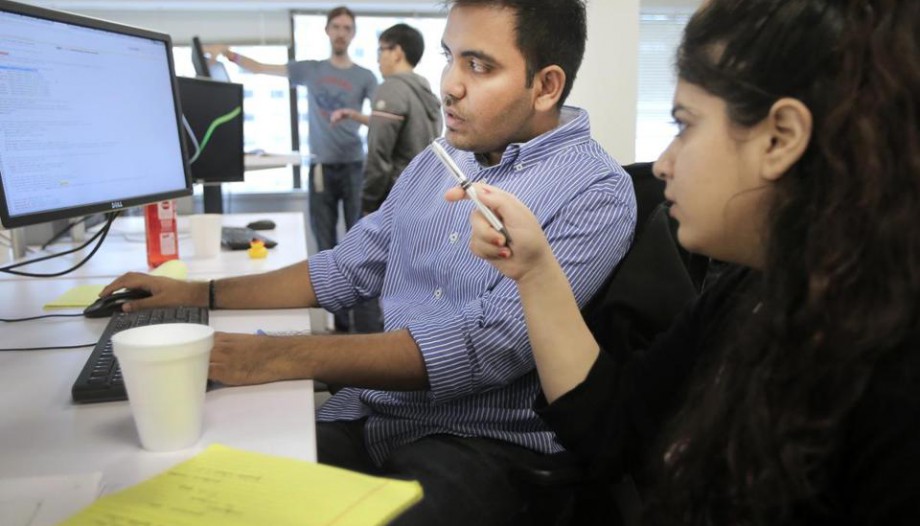From: betaboston.com
You don’t know quite what it means to be wanted, desired — practically stalked — if you are not a techie in Boston right now, especially one who might consider switching jobs.
Recruiters ping you on LinkedIn to check your current contentedness level. Companies sway you with swag on interview visits, and follow up with customized video messages. They host events to talk about the latest programming languages and techniques, offering five varieties of craft beer on tap. The auto shopping site CarGurus even dispatched a truck this summer to dole out free ice cream sandwiches in Kendall Square, just “to let people know we’d moved to the neighborhood and that we’re hiring,” says spokeswoman Amy Mueller.
“The war for talent is definitely on,” says Keith Cline of the Boston recruiting firm Dissero. Local tech companies and branch offices of big firms like Amazon.com are all trying to hire engineers, he says. “I don’t know if we’ve peaked or we are peaking, but it is insane,” says Cline, who also runs the tech news site VentureFizz.
How insane? One Boston company, the home goods retailer Wayfair, says it has about 100 open positions in engineering. Constant Contact, which sells marketing software to small businesses, threw a conference on the latest practices in software development last month, called Engineers4Engineers. Every software developer at the Waltham company received two tickets to give to friends. The conference and after-party were totally free.
Beneath the frenzy lies this fact: all the websites you’ll visit today, all the cash registers you’ll interact with, all the apps you’ll open require someone to write the code, test it, and continually make it better.
Two years ago, HubSpot shined a spotlight on how tough it was becoming for fast-growing companies to find talent when it began promoting a $30,000 bonus for anyone — inside or outside the company — who referred a software developer or designer who eventually got hired by HubSpot. Over the course of about six months, resumes coming into the company more than tripled, says David Cancel, the former executive who ran it. (These days, the bonus is a mere $10,000.)
Katie Burke, vice president of culture and experience at HubSpot, says more than the bonus, a bigger focus for the company is its co-op and internship program — “It’s definitely hard work, and absolutely not a short-term strategy, but it’s some of the most important work we do.” Even students who don’t join the company after a summer stint, she says, tell friends about it when they return to campus.
This year, the company began hosting evening engineering get-togethers that typically attract about 80 people, dubbed Tech Talk at Night. Instead of free beer, the company serves up signature cocktails based on the season. September’s featured drink? An aperol honey bourbon punch.
In Boston, the startup Localytics, which helps app makers build an audience and analyze usage, also hosts regular learning events for engineers. Director of engineering Adam Buggia explains, “We have a high close rate for candidates we extend offers to, so for us the biggest challenge is just getting them in the door. By having events where smart engineers come to our office and mingle with our engineers, we’ve already won half the battle.”
Other companies are creating programs that you might call “finishing schools” for programmers who might not ordinarily get an offer.
Steve Conine, co-founder and chief technology officer at Wayfair, says that as the Boston company grew and tech groups became more specialized within the company, “they would be reluctant to hire someone unless they checked off every box. They wanted the perfect fit.” If a candidate didn’t have a particular technical competency, they got passed over. “I started feeling like, ‘That’s killing me. Let’s get them onto the team if they have the passion and the attitude.’”
So beginning in the summer of 2013, the company started a new program to train people who had a science, tech, math, or engineering major, but not the requisite software skills to get hired at the company.
Now, the program is called Wayfair Labs, and all entry-level engineers are hired through it. They work to build prototypes of things that might be a little more experimental, or not at the top of the company’s priority list, Conine says — things like a mobile app to help employees find out where a colleague sits in the office. About 15 to 20 people join the program each month, Conine says, “and we’re trying to grow that number.”
They get exposure to the different parts of the engineering operation, they get paid as full-time employees during the program, and more than 80 percent of them eventually join one of Wayfair’s engineering teams permanently.
To announce the opening of a new engineering office in East Cambridge, the travel site Kayak hosted a hackathon in April, inviting students and professionals to come and create quick software applications over the course of 24 hours. The event offered $20,000 in prizes, and three months of free office space for one team. (Announcements of the event not-so-subtly mentioned more than 50 open jobs at the company.)
Can the competition for coders get even more intense? I’ve seen engineers delete their profiles from LinkedIn and other social media sites, specifically so they won’t be annoyed by recruiters. And on a visit to Microsoft’s Kendall Square conference center this week, as I was drying my hands in the restroom, I noticed a recruiting ad seeking engineers with experience in data science and machine learning on the paper towel dispenser.
Even the men’s room has become a front in the war for tech talent.








Leave a Reply
You must be logged in to post a comment.